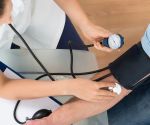Advertisement
Arthritis, an allergic reaction or trauma (such as a bone fracture) come to mind as common causes of swelling limited to the hand. But these are unlikely without an injury or pain or without coming into contact with something to which you're allergic. That only one hand is swollen also limits the potential causes.
Some causes that I'd consider include:
As you can see, there are many possible causes of your symptoms. See your doctor for an evaluation. The details of your swelling matter. A physical examination and some testing are necessary to identify the cause of the swelling.
Some causes that I'd consider include:
- Allergic: Despite the lack of an obvious allergic trigger, it could still be an allergic reaction. For example, if you wore a latex glove on your right hand and were allergic to latex, the hand might swell. However, I'd expect itching or rash along with your swelling.
- Low protein in the blood: This can go along with kidney or liver disease (among other causes) and can lead to painless hand swelling, but I would expect swelling in both hands and in your legs.
- Infection: An infection in the hand may cause swelling, but there's usually some discomfort, redness, and warmth. And there's often a puncture wound that allowed the infection to begin. Fever may go along with an infection of this sort.
- Past surgery or radiation in the area of the chest or arm: For example, if you've had lymph nodes removed for any reason, fluid from the arm may not be draining properly. That can cause swelling in the hand.
- Benign (noncancerous) tumor: If the swelling is limited to a "lump" or a nodule, a ganglion cyst could explain your symptoms. A fatty tumor (called a lipoma) over the hand could also make it appear swollen.
- A blocked vein: Veins in the arm, armpit or upper chest move blood and fluid out of the arm and back to the heart. A blocked vein can lead to swelling in the hand. If this were the case, I would expect the swelling to extend at least part way up the arm. Causes include blood clots, past injury, or radiation to the area of blood vessel blockage. In recent years, a rather common cause of a blood clot in the arm is the prior insertion of an intravenous catheter. This is when a nurse inserts a thin, hollow tube (called a catheter) into a vein in the arm, upper chest or neck to provide medications or fluids. This can be the site of infection or blood clot formation.
As you can see, there are many possible causes of your symptoms. See your doctor for an evaluation. The details of your swelling matter. A physical examination and some testing are necessary to identify the cause of the swelling.
Continue Learning about Inflammation
Important: This content reflects information from various individuals and organizations and may offer alternative or opposing points of view. It should not be used for medical advice, diagnosis or treatment. As always, you should consult with your healthcare provider about your specific health needs.







